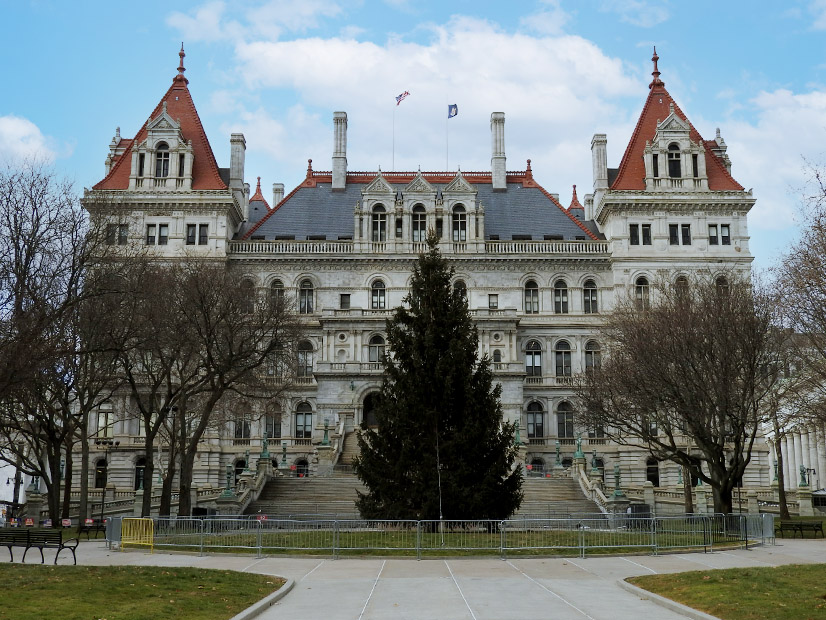p.p1 {margin: 0.0px 0.0px 0.0px 0.0px; font: 11.0px ‘Helvetica Neue’; color: #000000}
ALBANY, N.Y. — The New York State Legislature has started its 2023 session and is poised to take up many bills that build on the Climate Leadership and Community Protection Act (CLCPA).
Both Senate and Assembly committees will soon hold hearings on bills seeking to improve economic conditions for ratepayers, establish market rules that comply with the CLCPA and protect New York’s natural resources. The bills, among hundreds of others already in front of the legislature, include:
-
- S334, to update requirements for electricity bills;
- S404 and S402, to develop more residential advanced metering and microgrid energy storage;
- S737, to provide net revenue from renewable generators to low-income customers;
- S453, to review 18-month gas rate scheduling;
- S1487, to mandate that the governor alone select the two candidates for the locally nominated seats on the state Board on Electric Generation Siting and the Environment;
- S1275, to increase the number of trustees on the New York Power Authority by two, and mandate that the new seats be held by a resident of Niagara County and of St. Lawrence County; and
- S374 and S592, to add conditions for transmission approvals and renewable siting.
Other bills target environmental conservation through creating carbon dioxide pricing mechanisms; establishing a public water justice act; authorizing forest rangers to train search-and-rescue volunteers; and requiring annual climate expenditure reports (S732, S238, S28, S288).
Republican Priorities
Senate Minority Leader Robert G. Ortt last week outlined Republicans’ “Rescue New York” agenda, which includes calls for increasing energy affordability, stemming the flow of capital from the state, enacting climate policies that ensure affordable and reliable energy, and eliminating burdensome regulations.
In an email to RTO Insider, Ortt argued that “everyone agrees we need to move toward a clean energy future, but we need to do so by supporting common-sense energy policies that work.”
“The unachievable goals and radical policies set out by the Climate Action Council will only continue to drive New York residents and businesses elsewhere,” Ortt said. Republicans have “repeatedly requested a cost-analysis because we must understand the real implications that are going to land on the backs of New York’s ratepayers.”
The Republican agenda includes opposing proposed bans for natural gas hookups, requiring independent cost studies of all the CAC’s proposals and supporting burgeoning technologies, such as advanced nuclear and hydrogen.
One of the bills Ortt is sponsoring, S592, would prohibit siting wind farms within 40 miles of military installations. It is in response Apex Clean Energy’s proposed Lighthouse Wind Project in the towns of Yates and Somerset. The Niagara Falls Air Reserve Station is about 30 miles away from Somerset.
“The Niagara Falls Air Reserve Station is too much of an asset to Niagara County and our entire region to put its future at jeopardy with this proposed project,” Ortt said. “We cannot risk hindering the air base’s operations, security and potential new missions.”
Democratic Outlook
Assemblymember Didi Barrett (D), the newly elected chair of the Assembly’s Energy Committee, told RTO Insider that she plans on “supporting innovative energy generation practices and technologies, and working with state, local and community leaders to develop and to support the siting of renewable energy in an equitable and sustainable manner.”
Barrett said she will “develop thoughtful legislation that will help us meet our goals through a just energy transition.” The CLCPA emphasizes “the important balance between reaching our ambitious climate goals while protecting communities across New York.”
She also said she does not believe energy is a partisan issue, highlighting how she has “sponsored and passed numerous bills on a range of issues with bipartisan support” and “stands ready to work with colleagues in both parties and both houses to forge a path forward.”
Despite differences on what actions need to be take, which issues should be prioritized or what policies will be most effective, Barrett said legislators align on the fact that New York is at a critical stage and that actions taken this year will have a massive impact on the future.
Environmental Expectations
Climate action organizations are calling on politicians to uphold this year’s promises, particularly those made in Gov. Kathy Hochul’s State of the State address. (See Hochul Highlights Cap and Invest in State of the State Address.)
The New York League of Conservation Voters’ (NYLCV) recently released 2023 legislative priorities call for more offshore wind development, the creation of a clean fuel standard, more investment in green jobs and education, enhancement of coastal resilience, more funding for agencies charged with energy resources, and improvements to the access and quality of natural resources.
In an email to RTO Insider, NYLCV Policy Director Patrick McClellan said, “No silver bullet exists to solve the climate crisis overnight, or even in a couple years, but if we make the right decisions now, New York will be better prepared to withstand the impacts of climate change in the coming years.”
McClellan believes “it’s imperative that the state increase its offshore wind capacity through the timely procurement, responsible siting, government permitting and the transmission of 9 GW of offshore wind by 2035, while increasing our offshore wind goal to 20 GW by 2050.”
The Alliance for Clean Energy New York’s (ACE NY) 2023 legislative agenda closely aligns with legislation the organization supported previously.
It calls for bills that help renewable projects overcome construction barriers, codify state operations being powered entirely by renewables, promote clean transportation and buildings efforts and exempt energy storage resources from the sales tax.
ACE NY “supports legislation that enhances market opportunities for large-scale, grid-connected renewables; for smaller-scale distributed renewable energy; for energy efficiency; and the electrification of transportation.” It opposes bills that “would unduly or unfairly restrict clean energy development in New York state.”

